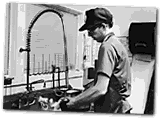FASTER
Michael Jones on The Fuel Tour
 One month. Eleven cities. A tour bus. A tour manager. Four "fresh new voices" marketing themselves directly to the largest demographic audience of the nation. Four bands? No, four films. A "cinematic Lollapalooza" as their slick sponsorship proposal reads.
One month. Eleven cities. A tour bus. A tour manager. Four "fresh new voices" marketing themselves directly to the largest demographic audience of the nation. Four bands? No, four films. A "cinematic Lollapalooza" as their slick sponsorship proposal reads.
The brainchild of filmmaker and New York Women's Film Fest director Suzanne Myers, the Fuel Tour is what happens when young, highly energized filmmakers reach the end of their festival runs without a distribution deal in place. Myers, the writer/director of Alchemy, an enigmatic story of a young woman's self discovery, came up with the idea while on the festival circuit. Unimpressed with the distribution offers she'd received for her film, the idea started to take form.
At the '96 South by Southwest Film Festival in Austin, Myers hooked up with the team behind the festival hit The Delicate Art of the Rifle -- a smart, imaginative riff on generational identity set on a college campus terrorized by a sniper. Rifle also hadn't received serious distribution offers, so the idea hit well with Dante Harper, the director and member of the group responsible for the film, the Cambrai Liberation Collective. Chris Smith's highly praised but little known comedic essay on minimum-wage labor, American Job, became the third chosen for the ride. Producers' rep John Pierson had taken Job to Sundance in '96 but after two American Spectrum screenings, it too was without a distributor. Earlier this year the trio picked up another Sundance film, Arresting Gena, Good Machine's production of Hannah Weyer's story of two teen girls lost in the slow burn of adolescence.
 While individually the filmmakers had been encouraged by successful fest screenings, it was hard not to take distributor rejections personally. Says Good Machine's Ted Hope, a tour advisor to Fuel, "I think anybody could have said to [the filmmakers], in terms of the current market, that these films will not be able to be handled in the typical distribution form." ("Ours are very dangerous films, that's why they don't have distribution," is Harper's read.)
While individually the filmmakers had been encouraged by successful fest screenings, it was hard not to take distributor rejections personally. Says Good Machine's Ted Hope, a tour advisor to Fuel, "I think anybody could have said to [the filmmakers], in terms of the current market, that these films will not be able to be handled in the typical distribution form." ("Ours are very dangerous films, that's why they don't have distribution," is Harper's read.)
Initially, explains Myers, "when you make a film, a lot of the big studio producers and distributors call you up. Nobody wants to miss out, but nobody wants to commit either." The most difficult part for Myers was simply trying to get distributors to say no. And when the rejections finally came, it was hard not to take them personally -- especially rejections guised in the form of a compliment. "It's too arty. It's too smart. Who exactly is the audience? How can we market this film?" The final word from distributors for all the Fuel films was relatively uniform. "I spent a lot of time trying to show distributors who the audience was," explained Myers. "It was a waste of time."
Confident that an audience exists for the films, though, the filmmakers prepared the tour's groundwork, and a unique manifesto was struck around designer Alicia Kratzer's tour concept via Rifle writer Stephen Grant: "Films shouldn't be delivered like snack chips on their way to a national convenience chain. They should be delivered like a car bomb, in the dead of night... Films should burn."
 As cinema's very roots began in the sideshow mystique of the early 1900's -- the Lumiere Brothers were accustomed to watching frightened audiences flee circus tents at the sight of the charging locomotive in their famous film, Arrival of a Train at a Station -- so do these filmmakers hope to draw a similarly thrill-starved audience of young professionals and college students.
As cinema's very roots began in the sideshow mystique of the early 1900's -- the Lumiere Brothers were accustomed to watching frightened audiences flee circus tents at the sight of the charging locomotive in their famous film, Arrival of a Train at a Station -- so do these filmmakers hope to draw a similarly thrill-starved audience of young professionals and college students.
The Independent Film Channel is a major sponsor of the Fuel tour, along with the Conde Nast publications of GQ, Vanity Fair, and Details. Dockers is also along for the ride. The sponsors' logos will appear on trailers, programs, and on the tour bus itself. The IFC will also screen three of the four films after the tour (Arresting Gena is the exception; it's t.v. sales are being handled by Good Machine). In return, the three sponsors are putting up a majority of the tour's low-six-figure budget.
The Fuel partners hope that the tour will lay the groundwork for an entirely new way of marketing indie films. States Harper: "I really like the idea of taking money from large organizations that would otherwise use it poorly and using it for something good. It's a pretty good deal for the companies to cash in on our 'hipness', but I think it's a much better deal for us."
With this demographic in mind, Myers went to work on finding funding for the tour, a process not unlike fundraising for a film. She explains, "I tried to think of people who would be interested in the idea -- companies that were sort of progressive and interested in film and who are trying to reach the same audience that we think we'll reach. When I first started doing this I looked at different film festivals and started to notice that the same companies do a lot of stuff. Absolut and The Gap are really interested in indie film right now." After some research, Myers found the right person to approach at each corporation and sent targeted packages of materials. As Fuel was created as a for-profit venture, she found herself talking to advertising and promotions departments rather than the corporate foundations that usually give to non-profits.
 Most of the sponsors asked to see the films in case they contained potentially scandalous materials, but unlike the distributors, Myers says, the companies more easily saw their demographic in the tour's audience. She says the sponsors didn't worry about the films' more experimental narratives or their collective lack of star power. Still, some aspects of corporate fundraising remained similar to finding distribution. "It takes forever to land a sponsor," Myers explains. "It is so slow and you have to go through so many levels of bureaucracy. I feel like with all these companies, why can't they just say 'yes' or 'no.' You have to gauge the length of time you're going to give them. Starbucks led us on for three months. They said, 'We really want to do it, give us another week' before they finally backed out. And you waste a lot of time when you could've gone to other coffee companies. It's really similar to finding a distributor."
Most of the sponsors asked to see the films in case they contained potentially scandalous materials, but unlike the distributors, Myers says, the companies more easily saw their demographic in the tour's audience. She says the sponsors didn't worry about the films' more experimental narratives or their collective lack of star power. Still, some aspects of corporate fundraising remained similar to finding distribution. "It takes forever to land a sponsor," Myers explains. "It is so slow and you have to go through so many levels of bureaucracy. I feel like with all these companies, why can't they just say 'yes' or 'no.' You have to gauge the length of time you're going to give them. Starbucks led us on for three months. They said, 'We really want to do it, give us another week' before they finally backed out. And you waste a lot of time when you could've gone to other coffee companies. It's really similar to finding a distributor."
October Films co-founder and filmmaker (Childhood's End) Jeff Lipsky will book the film in arthouses along the 11-stop route. The box office take will be split four ways after expenses in an "all for one, one for all" strategy. Four prints of each film will circulate to the tour cities for week-long runs of double features. The tour bus will arrive at each venue for a couple of nights of seminars and interviews. The mechanics will be managed by Jackie Ferry, tour manager behind the rock group Hole and Stereolab, and a behind-the-scenes documentary will chronicle the trip in addition to webcast diaries on a site designed by Adam Pincus. All this adds up to what to T. Todd Flinchum, producer of Rifle, describes as "a self perpetuating marketing plan without having to involve large portions of money."
It has already been a long road for the tour. In December of last year, Fuel was signed on with the Sundance Channel as their presenting sponsor. At the last minute, the Channel backed out due to it's own budget concerns.
The IFC, which had proved to be a successful default sponsor for another Sundance cast-off, John Pierson's t.v. show "Split Screen", eagerly climbed on board. Later, Myers says, the Sundance Channel came back to the filmmakers, but they rejected them. The Sundance Channel was "sort of apologetic about what happened," says Harper. "They might have more resources but we learned the hard way that that really doesn't mean anything."
Although the filmmakers hope their films will be able to remain in the theaters after the week run, they face the current sorry state of the art house circuit. Will a successful grassroots, word-of-mouth campaign be enough to keep the films in the theaters in the face of the next Miramax or Fox Searchlight release? Hope optimistically proposes that other "indie art film exhibitors will see [these films'] connection with their audience and the films could open theatrically in other markets." Although the tour is limited by the number of film prints, the Fuel players welcome that possibility.
The Fuel tour may create a potentially lucrative trademark such as Lollapalooza, but, as Harper says, "The point of all this is not to make money but to make another fucking film. That's all any of us care about."
VOD CALENDAR


 See the VOD Calendar →
See the VOD Calendar →


